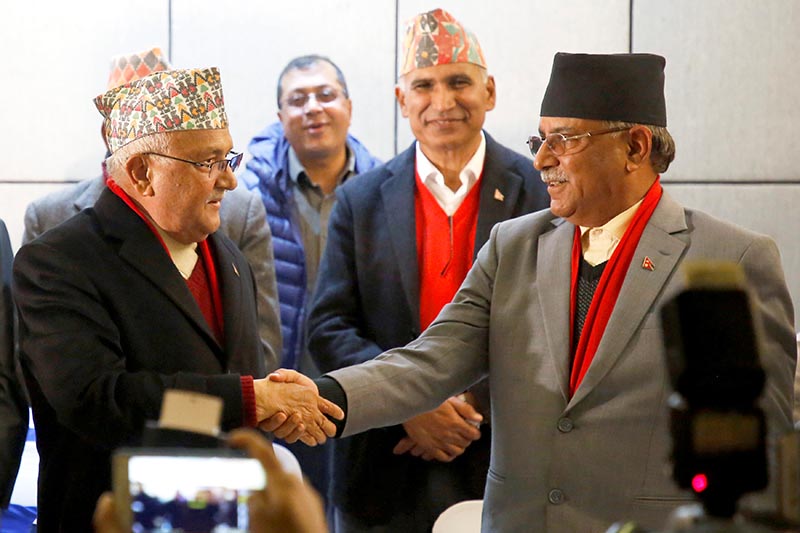Discussions stuck at organisational structure of unified communist party
Kathmandu January 1
Even as three weeks have already passed since the completion of parliamentary and provincial elections, the left alliance leadership has failed to convene meeting of the Party Unification Coordination Committee.
Forging an alliance before the elections on October 3, the leaders had said the committee would meet immediately after the polls (which concluded on December 7) and the process of unifying the two alliance constituents — the CPN-UML and the CPN-Maoist Centre — would be taken ahead.
Two top leaders — UML Chairman KP Sharma Oli and CPN-MC Chairman Pushpa Kamal Dahal — had gone to the extent of saying that they had planned to merge the parties before elections, but could not do so due to time constraint. Then, they had said that the issue would be overseen by the committee.
The major reason for failure to convene the committee’s meeting, according to left alliance leaders, is that the top leaders are yet to reach common ground on the organisational structure of the unified party. Oli and Dahal are still holding talks on the organisational structure, the leaders said. “Oli and Dahal have kept their talks secret and have not shared the developments even with other members of the committee,” said a source.
The other members of the panel are Madhav Kumar Nepal, Jhalanath Khanal and Ishwor Pokharel from the UML, and Narayan Kaji Shrestha and Ram Bahadur Thapa from the CPN-MC.
According to CPN-MC leader Shrestha, the meeting is being delayed because the two top leaders are yet to finalise the unification agenda to be discussed in the committee. “The meeting will convene only after the two leaders finalise the agenda,” he said.
Oli and Dahal were scheduled to hold a meeting today, but it could not happen due to Oli’s health-related complications.
Alliance leaders have floated an alternative proposal under which the party will have a 99-member central committee, while the politburo will have one-third members of the central committee, the standing committee will have one-third members of the politburo, and the office bearers will be one-third of the standing committee.
If this system is executed, it is likely that most of the leaders will have to face demotion. Oli and Dahal too are not in favour of a jumbo central committee. The CPN-MC presently has 4,000 members in its Party Convention Organising Committee.
The proposal also talks about one-person-one-post model, under which one person cannot hold more than one post.
Besides organisational structure, the two parties also need to reach common ground on ideological aspects and give respectable roles to top leaders.
Sharing of posts is another difficult issue to resolve. While the CPN-MC wants one of the two crucial posts — prime minister or chairman of the unified party — the UML has so far remained mum on the matter.






